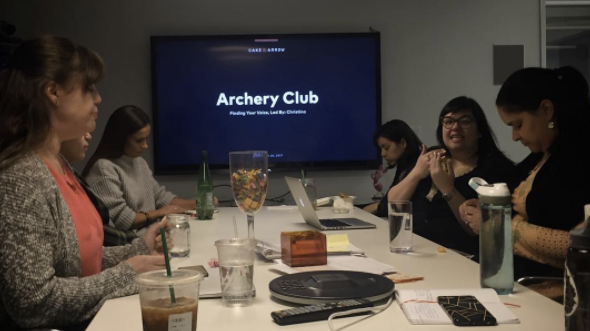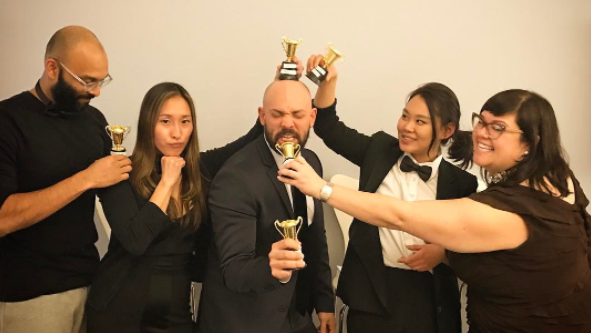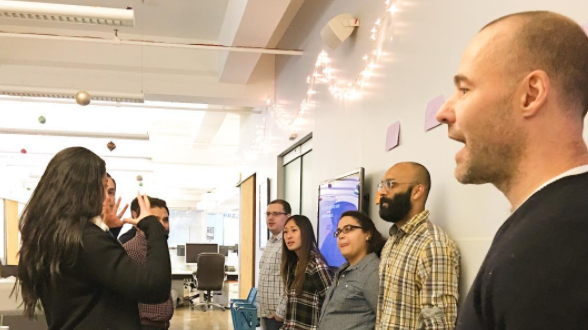March is a pretty gloomy month. The weather can’t make up its mind, Summer Fridays are painfully far away, and the final effects of our Holiday Break have long worn off. Work is back in full swing for the new year, and let me just say on behalf of all the worker bees out there: the struggle is real.
Speaking of “the struggle,” I can’t seem to figure out why so many companies are afraid to talk about their struggles. All companies go through tough times, and the smart ones are able to use their challenges as opportunities to learn, grow, change, and ultimately become better for it. Struggles make us human, and the only way to learn from them is by talking about them.
Like any company, Cake & Arrow has its ups and downs and 2016 was no different. After 14 years of being Alexander Interactive, we rebranded ourselves as Cake & Arrow. Think Prince becoming “the artist formerly known as Prince.” Naturally, it was exciting, but it was also challenging.
Just to give you a little context. I’ve been the Office Manager here at Cake & Arrow for a little over 2 years now. It’s part of my job to foster culture, sustain morale, and make this a best place to work. Now that’s definitely easier said than done – especially when people are stressed out with project work, back-to-back meetings, and tight deadlines. Add on the additional stress that comes with a rebrand, and I have my work cut out for me. The pressure is on, the tension is palpable, and I already know that no happy hour is going to fix it.
That’s because morale is deeper than the free beer you give to employees; it can’t be bought through snacks or staged for photographs. It shouldn’t change with the wind or with the ups and downs of a company. True morale is about the ability to stay passionate, focused, and motivated, even when things get tough. That’s why investing in morale can determine the success or failure of a company.
As both an employee and someone who has succeeded (and failed) at my attempts to sustain morale at Cake & Arrow, here’s the gist of what I’ve learned: Be honest. Break the taboo. Make it okay to talk about things that aren’t easy to talk about, and formalize the process to do so. Your employees will respect you more for it.
More specifically, here are 5 things every company can do to sustain morale:
–
Make company culture a part of your positioning.
Now that pretty much every company (and their mom) is on social media, of course you are going to want to Instagram the crap out of last night’s kick-ass Happy Hour. But culture doesn’t have to be (and shouldn’t be) just the fun stuff. Culture should be more about the attitudes and mindsets you adopt as a company, and how they infuse the work that you do and the relationships you have with one another. To employ an apt metaphor, the happy hours and holiday parties are just the frosting on your culture cake. Making these attitudes and mindsets a part of your company positioning is the equivalent of baking your cake before you frost it. Positioning is about more than your competitive edge. It’s about who you are inside and out. And remember, positioning can be aspirational. Use your positioning to decide who you want to be, and then design a workplace (including but not limited to free beer and costume parties) to help you live out this positioning. As you do this, it’s important to create an open dialogue on what kind of culture you ultimately want to have, and give your team the opportunity to voice their opinions! After all, culture is only ever as good as the people it’s comprised of.
Commiseration is key.
With our coworkers, we commiserate all the time. When we’re all in the trenches together and working late to push a project to launch, we can’t help but seek solace in knowing that we’re not alone. But commiseration can easily lead to plain old complaining. One way to keep this from happening is to formalize the “commiseration process,” so that it’s both regular and contained. If companies don’t take time to listen to people’s’ dissatisfaction, then their employees will find other means of communicating it, ultimately risking an us vs. them mentality. So give employees space and time to vent. You may not agree with their complaints, and may even feel the urge to counter – but just let them vent away. You’re not committing treason here, you’re simply breaking down the barrier between you and your employees and making them feel heard. If your employees feel like they’re being heard, even if there’s nothing you can do about it, it creates trust and trust becomes loyalty, both of which are critical to sustaining morale, especially when times get tough.
Create safe spaces.
Diving deeper into the concept of building trust, how do we develop reciprocal trust between different levels within the professional hierarchy? Simple answer: by creating space where this hierarchy is collapsed, even if it’s just temporary. At Cake & Arrow, we hold what we call our monthly Archery Club meeting, a club designed by women for women, to help provide the tools and platforms for us to overcome obstacles and succeed as women in business. Our club is organized by our Director of User Experience, Christina Goldschmidt, but during that sacred hour of female bonding she’s just a fellow woman (although a badass one) sharing struggles similar to ours. During these meetings, there’s no power hierarchy, it’s just a safe space for women to connect through shared experience. And even though employees are busy with their respective workloads, I can personally attest to how excited we all are to join those meetings. We get to know each other on a much more personal basis, which creates trust between us, regardless of where we fall on the professional hierarchy.

Events should serve a larger purpose.
I’ve thrown about 50 events during my time here at Cake & Arrow: some of them hits, some of them misses. Through 2 years of trial and error, I’ve learned that events should ultimately serve a larger purpose other than giving away free beer. For us, this has meant hosting a trivia night to reinforce teamwork, or throwing an awards show to show our employees that they’re appreciated. Events should tie into what kind of company culture you want to have (ie. your positioning), but should also be timely, addressing the specific needs your team at the time. After two years, I think I’ve gotten the hang of it: I go into every brainstorming session with a goal in mind, related either to our positioning or to a specific challenge we are facing as a team, a theme I want to adhere to, and try to think of tangible ways to harness the spirit of this weird quirky place I work at.

Collaboration is an art. Practice it.
Collaboration ain’t easy. Just like in any of our other personal relationships, it takes time and effort to learn how to build mutual respect, communicate effectively, and navigate the give and take required to work effectively in an organization. It’s easy to assume that with time, people will get the hang of it – but with project deadlines around the corner, sometimes it needs to be facilitated.

Recently, we’ve leveraged weekly team-working sessions to further boost our collaboration efforts. I won’t dive into the details of what people discuss because what happens in team-work, stays in team-work – but suffice to say, it’s been lit. Tying back to the concept of creating a “safe space,” our teams now have the platforms to share how to collectively move past obstacles, respectfully hold each other accountable, or show vulnerability to one another. Communication and collaboration is always a work in progress, but with practice and reinforcement, people can do amazing things.
–
This is not to say that we’ve figured it all out. Our morale still fluctuates like our moods, the pressure of project deadlines still gets the best of us, and we still have something to commiserate about. But there is a silver lining: the struggles that we’re addressing in this very public forum are making it easier for people to talk about the things that aren’t easy to talk about. Perhaps we’re even breaking the taboo.